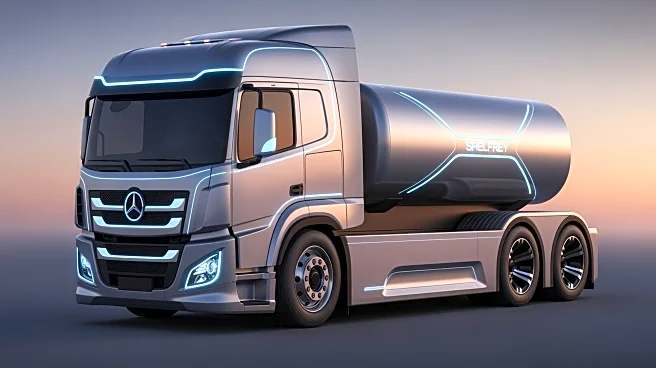What's Happening?
Isuzu Motors Limited has announced upgrades to its heavy-duty GIGA LNG and GIGA CNG trucks, enhancing both environmental performance and safety features. As the sole manufacturer of natural gas trucks in Japan,
Isuzu has been committed to promoting natural gas vehicles for nearly 30 years, aiming to reduce environmental impacts and improve energy security. The upgraded trucks offer a combination of low emissions and usability comparable to diesel vehicles, with LNG models capable of being refilled quickly and supporting long travel distances. These trucks can operate on carbon-neutral gases like biomethane, contributing to decarbonization goals. Additionally, Isuzu has introduced the Emergency Driving Stop System (EDSS) to these models, enhancing safety by automatically applying brakes when hazards are detected.
Why It's Important?
The upgrades to Isuzu's GIGA LNG and CNG trucks represent a significant step towards achieving a carbon-neutral society. By reducing emissions of particulate matter and nitrogen oxides, these vehicles address major air pollution concerns. The ability to use carbon-neutral gases positions these trucks as key players in the transition to sustainable transportation. The introduction of advanced safety features like the EDSS further underscores Isuzu's commitment to safety and environmental responsibility. This development is crucial for industries reliant on heavy-duty transportation, as it offers a viable alternative to diesel-powered vehicles, potentially influencing market trends and regulatory standards in the automotive sector.
What's Next?
Isuzu plans to continue exploring the potential of carbon-neutral products through a multi-pathway approach, considering diverse applications and characteristics of commercial vehicles. As carbon-neutral gases become more widespread, the GIGA LNG and CNG trucks are expected to play a larger role in achieving low-carbon and decarbonization goals. The adoption of these vehicles in pilot projects has already demonstrated their operational viability, suggesting a promising future for their broader implementation. Stakeholders in the transportation and logistics industries may increasingly consider these trucks as part of their sustainability strategies, potentially leading to further innovations and collaborations in the sector.
Beyond the Headlines
The upgrades to Isuzu's trucks highlight the growing importance of sustainable practices in the automotive industry. The focus on reducing emissions and enhancing safety reflects broader trends towards environmental responsibility and consumer safety. As industries face increasing pressure to adopt sustainable practices, Isuzu's advancements may influence other manufacturers to prioritize similar innovations. The integration of carbon-neutral technologies in commercial vehicles could also drive regulatory changes, encouraging more stringent environmental standards and fostering a culture of sustainability across the industry.










